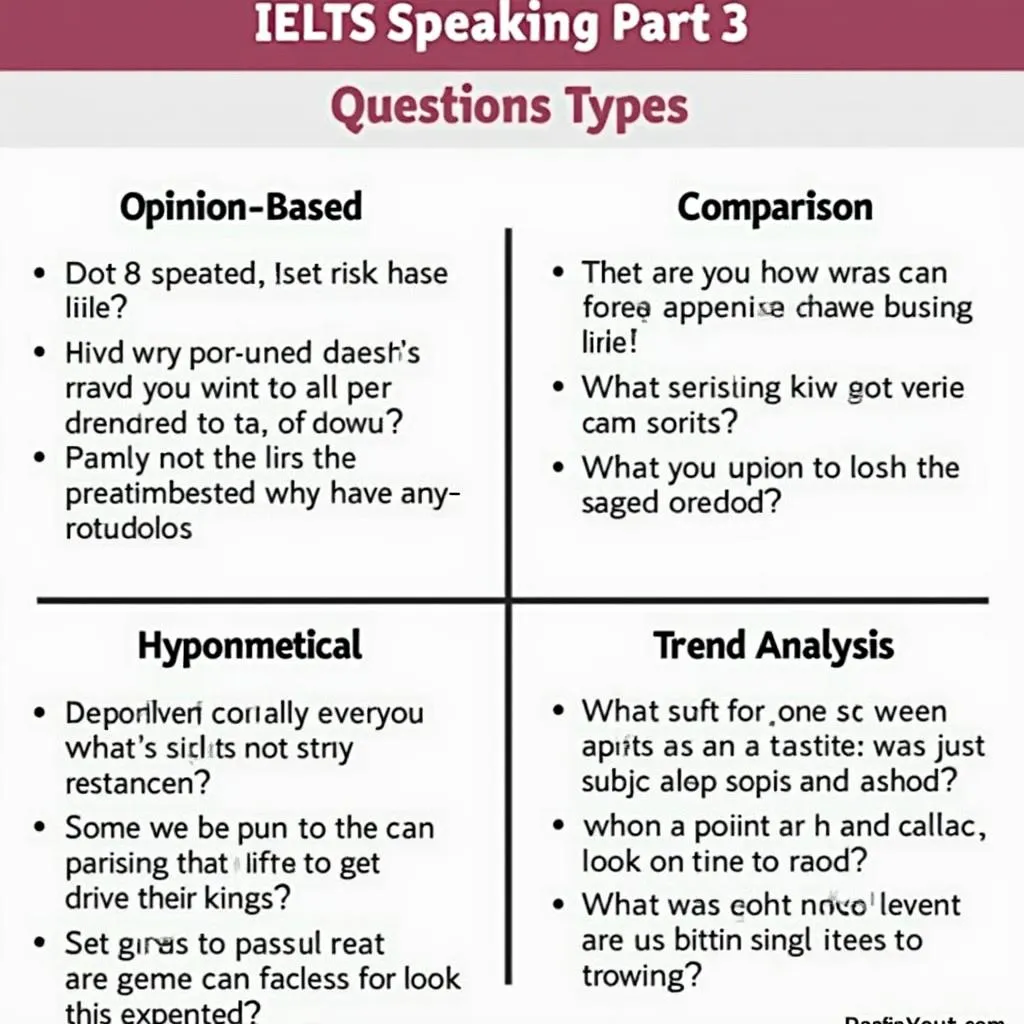Understanding IELTS Speaking Part 3
IELTS Speaking Part 3 is often considered the most challenging section of the speaking test. It requires candidates to engage in a more abstract and in-depth discussion on topics related to those introduced in Part 2. To excel in this section, it’s crucial to develop effective strategies that showcase your language skills and critical thinking abilities.
The Nature of Part 3 Questions
Part 3 questions typically explore broader themes and require candidates to express opinions, make comparisons, discuss hypothetical situations, and analyze trends. These questions are designed to assess your ability to communicate effectively on complex topics.

Key Strategies for IELTS Speaking Part 3
1. Develop Your Ideas
One of the most important strategies for Part 3 is to provide extended, well-developed responses. Here’s how to achieve this:
- Use the PEEL structure: Point, Explain, Example, Link
- Elaborate on your initial answer with reasons and examples
- Connect your ideas to broader contexts or personal experiences
For instance, if asked about the impact of technology on education, you might say:
“Technology has revolutionized education in numerous ways. (Point) One significant impact is the increased accessibility of information. (Explain) Students can now access a wealth of knowledge instantly through online resources, which was not possible in the past. (Example) For instance, I recently used an educational app to learn about quantum physics, a subject not offered at my local school. (Link) This demonstrates how technology is breaking down traditional barriers to learning and enabling students to explore subjects beyond their immediate curriculum.”
2. Use Advanced Vocabulary and Structures
Incorporating sophisticated language is crucial for achieving a high band score. Consider these tips:
- Employ topic-specific vocabulary
- Use idiomatic expressions naturally
- Demonstrate a range of complex grammatical structures
For example, when discussing environmental issues:
“The proliferation of single-use plastics has reached alarming proportions. While convenience is often cited as a justification, the long-term ramifications far outweigh any short-term benefits. It’s high time we adopted more sustainable alternatives and fostered a culture of environmental stewardship.”
3. Practice Critical Thinking
IELTS Speaking Part 3 often requires you to analyze issues from multiple perspectives. To excel:
- Consider both sides of an argument
- Discuss causes and effects
- Evaluate advantages and disadvantages
When addressing a question about the pros and cons of social media, you might say:
“Social media platforms have undoubtedly transformed the way we communicate and share information. On the one hand, they’ve facilitated global connectivity and provided a platform for marginalized voices. Conversely, issues such as privacy concerns and the spread of misinformation have emerged as significant drawbacks. Ultimately, the impact of social media depends largely on how individuals and societies choose to utilize these powerful tools.”
4. Manage Time Effectively
Proper time management is essential in Part 3. To ensure you provide comprehensive answers without running out of time:
- Aim for responses lasting 1-2 minutes
- Use discourse markers to organize your thoughts
- Practice pacing yourself during mock interviews
For instance, you could structure your response like this:
“There are several factors to consider when discussing this issue. Firstly… Secondly… Moreover… On the other hand… In conclusion…”
5. Handle Difficult Questions
You may encounter questions that you find challenging. Here’s how to navigate them:
- Don’t panic if you’re unsure about a topic
- Use paraphrasing techniques to buy thinking time
- Draw on general knowledge and logical reasoning
If faced with a question about a unfamiliar topic, you might say:
“That’s an intriguing question. While I’m not an expert on this subject, I can offer some thoughts based on my general understanding. From what I’ve observed…”
Preparing for IELTS Speaking Part 3
To effectively implement these strategies, consistent practice is key:
- Regularly engage in discussions on a wide range of topics
- Record yourself and analyze your responses
- Seek feedback from native speakers or IELTS instructors
- Stay informed about current affairs and global issues
- Build a bank of personal examples and anecdotes to support your answers
Remember, the goal is not to memorize responses but to develop the skills to articulate your thoughts fluently and coherently on any given topic.
Conclusion
Mastering IELTS Speaking Part 3 requires a combination of language proficiency, critical thinking, and effective communication strategies. By implementing the techniques discussed in this guide and dedicating time to regular practice, you can significantly enhance your performance in this challenging section of the IELTS Speaking test. Remember, confidence comes with preparation, so approach your practice sessions with the same focus and determination you’ll bring to the actual exam.